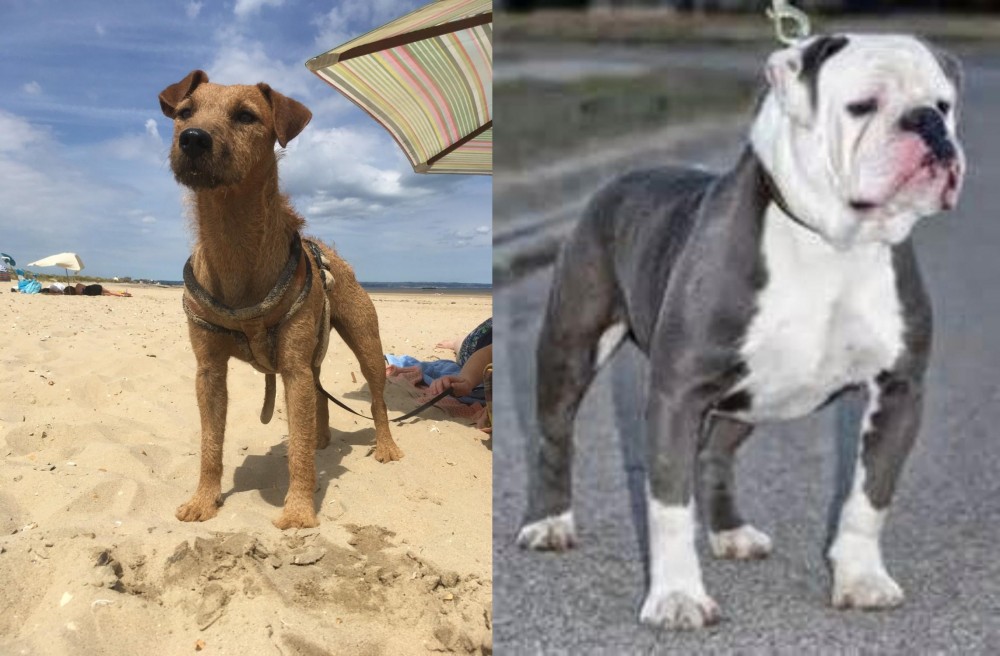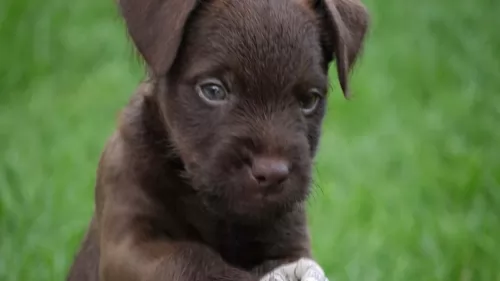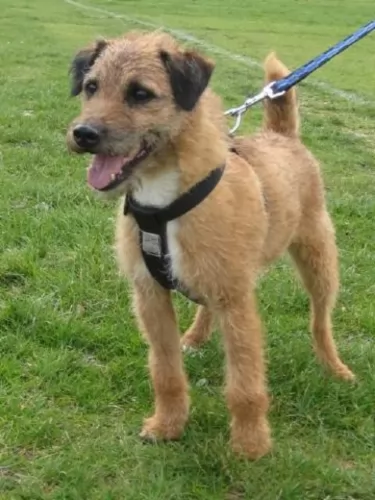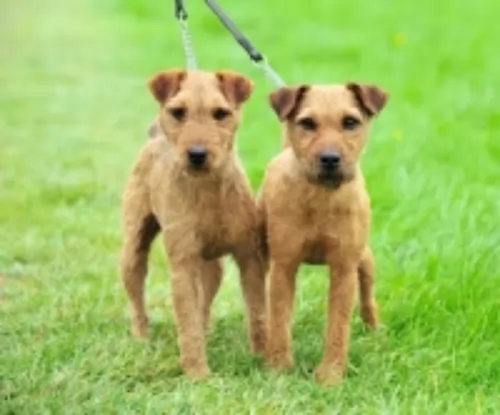 Petzlover
Petzlover Both Fell Terrier and Old English Bulldog are originated from United Kingdom. Both Fell Terrier and Old English Bulldog are having almost same height. Fell Terrier may weigh 13 kg / 28 pounds lesser than Old English Bulldog. Both Fell Terrier and Old English Bulldog has same life span. Fell Terrier may have less litter size than Old English Bulldog. Fell Terrier requires Moderate Maintenance. But Old English Bulldog requires Low Maintenance
Both Fell Terrier and Old English Bulldog are originated from United Kingdom. Both Fell Terrier and Old English Bulldog are having almost same height. Fell Terrier may weigh 13 kg / 28 pounds lesser than Old English Bulldog. Both Fell Terrier and Old English Bulldog has same life span. Fell Terrier may have less litter size than Old English Bulldog. Fell Terrier requires Moderate Maintenance. But Old English Bulldog requires Low Maintenance
 Fell terriers, known by other names such as Lakeland-, Patterdale-, Red Fell or Black Fell Terrier are small working terriers, hailing from the fell or hilly country of northern England.
Fell terriers, known by other names such as Lakeland-, Patterdale-, Red Fell or Black Fell Terrier are small working terriers, hailing from the fell or hilly country of northern England.
Several breeds have been developed from the Fell terrier, of which the Patterdale Terrier, Lakeland are some as well as other locally developed breeds. All these particular breeds are sometimes referred to as the Fell Terrier, and in fact the National Terriers Club LLC has published a Fell Terrier standard.
It is also believed that the long legged Fell Terriers may have descended from an old type of terrier referred to as the rough-coated Black and Tan. The Black and Tan Terrier is now extinct but was drawn into The Kennel Club as the Welsh Terrier.
 This is an extinct dog breed. It is believed that the dog came from ancient dogs such as the old Mastiff. The Old English Bulldog was the original English Bulldog but quite different from the modern variety, with longer legs as well as a longer muzzle and more aggressive.
This is an extinct dog breed. It is believed that the dog came from ancient dogs such as the old Mastiff. The Old English Bulldog was the original English Bulldog but quite different from the modern variety, with longer legs as well as a longer muzzle and more aggressive.
It is believed that the Old English Bulldog was the ancestor to many breeds and there have been efforts to recreate the Old English Bulldog, bringing about quite a few new Bulldog breeds. Records are actually unclear as to its origins and when you read up on its ancestry, you see that a lot of the information is conflicting.
A number of breeders have attempted to recreate this extinct breed with some success, but it must be borne in mind that these recreations aren’t the Old English Bulldog, as the genetics of it are extinct.
 Small and feisty, the Fell Terrier is a working dog used for hunting purposes. He stands at roughly 31cm to 38cm in height and ways between 6 to 9kg.
Small and feisty, the Fell Terrier is a working dog used for hunting purposes. He stands at roughly 31cm to 38cm in height and ways between 6 to 9kg.
The dogs were sought after for their hunting skills as being the small dog they were, and with their narrow chests, they were able to move around in small, narrow underground tunnels.
The Fell has long legs, and his coat is shortish but with a rough texture to it. The coat is found in different colors such as white, black and tan, chocolate, red, black and bronze. The ears are medium length and floppy while the tail of the dog is traditionally docked, but these days the tail is often left long, and then he becomes less distinctive.
Used to having hunted in packs, the Fell Terrier has always been used to getting along well with other dogs. He makes a fantastic family pet and will get on well with children who have been been taught to respect animals. He is an independent, strong-willed dog and will certainly need socialization and training to turn him into an obedient dog.
He is energetic, fearless, strong-willed, determined and always ready for a game or some form of action.
 This dog is extinct but he used to be a fairly broadly set, muscular dog, taller than the bulldog of today.
This dog is extinct but he used to be a fairly broadly set, muscular dog, taller than the bulldog of today.
The average height of this dog was 36 – 40cm, weighing in at about 18 to 22kg. One of the dog’s more noticeable characteristics was his lower jaw that projected quite a bit in front of the upper jaw. The dog was deep-chested, the head broad and the nose and muzzle short.
The breed was developed for bull baiting, but in England, with the adoption of the Act of cruelty to animals, there was a decline in the interest for the dog, leading to it becoming extinct. There are old paintings from the 1800s and one such painting, Crib and Rosa, gives an idea of the form and size of the Old English Bulldog.
The regular English Bulldog today is often confused with the Old English Bulldog but it is a far sweeter breed than the Old English Bulldog. It is believed that the Old English Bulldog was an aggressive dog, bred to be this way because of his role in bull baiting.
As a pet though, brought up as a companion, he no doubt would have made a loving, loyal pet.
 The Fell Terrier still has dreams of the hunt in him and with his strong prey instincts, he isn’t really suited to city living, but will fit ideally into life in the country.
The Fell Terrier still has dreams of the hunt in him and with his strong prey instincts, he isn’t really suited to city living, but will fit ideally into life in the country.
He is a high spirited, working dog with an endless amount of energy. He bonds closely with his human family, and for all his robust, larger-than-life attitude and boldness, when he is with his human family he can be gentle, calm and loving, just thriving on the love he receives.
Your Fell Terrier is just waiting to be your best friend and a never ending source of unconditional love.
 Not much information is available on this extinct dog. Perhaps because of his history of being used for bull baiting, he wouldn’t have made a good family pet as he was too aggressive. He wouldn't have been a good choice for a first time dog owner and he wouldn't have been a good choice of pet for children.
Not much information is available on this extinct dog. Perhaps because of his history of being used for bull baiting, he wouldn’t have made a good family pet as he was too aggressive. He wouldn't have been a good choice for a first time dog owner and he wouldn't have been a good choice of pet for children.
He was possibly owned by a single person who made money from him. Small wonder then that he became extinct when he was no longer required for this role.
 Caring for your Fell Terrier requires knowing what do do with him when he develops certain common dog illnesses. He is a robust dog and is not likely to get any serious illnesses, but still you want to know about some of the more common ones.
Caring for your Fell Terrier requires knowing what do do with him when he develops certain common dog illnesses. He is a robust dog and is not likely to get any serious illnesses, but still you want to know about some of the more common ones.
If you suspect an illness, get your pet to the vet who can provide you with a treatment plan for your dog.
Your Fell Terrier can easily fall prey to dental disease if you don't brush his teeth at least 2 or 3 times a week. Unfortunately bad teeth isn't just a case of losing a tooth or two, bad teeth can cause serious diseases such as kidney disease. Tarter build-up progresses to infection of the gums as well as roots of the teeth. So serious is dental disease that your dog can actually have his life shortened.
Your Fell Terrier is a small dog and obesity can easily creep up if you don't control your pet's diet. Obesity is a serious illness that can increase problems with the joints and digestion.
 This dog, although extinct would have battled with common dog illnesses that can still be seen in the modern bulldog today.
This dog, although extinct would have battled with common dog illnesses that can still be seen in the modern bulldog today.
Brachycephalic airway syndrome is all about upper airway abnormalities and can be quite a problem in your Old English Bulldog because of the shortened muzzle of these breeds. These particular dogs have a smaller upper jaw and an overcrowding of of teeth and you will see that effort is required to inhale. They breathe more easily through the mouth then the nose. They have noisy breathing, particularly during exercise and in hot weather.
Dogs have 3 eyelids, and cherry eye is the term used for prolapsed nictitating membrane, or the 3rd eyelid, when the eyelid comes out of place and you get a pink mass. It is a common condition found in Bulldogs, a genetic problem where surgical intervention or medicine may be recommended.
 Your Fell Terrier is an active dog who won’t thrive if he is cooped up and ignored. He thrives on action and will need to be taken on walks with you and involved in all your games and sports, such as when you go jogging, swimming or cycling.
Your Fell Terrier is an active dog who won’t thrive if he is cooped up and ignored. He thrives on action and will need to be taken on walks with you and involved in all your games and sports, such as when you go jogging, swimming or cycling.
Feed your Fell Terrier the best quality commercially manufactured foods if you opt to feed your pet this way. Include cooked brown rice, vegetables and chicken into his kibble from time to time and always ensure there is cool, fresh drinking water available to him.
It depends on whether your Fell Terrier has a short, smooth coat, or the longer-haired coarse coat. He will certainly need brushing twice a week and sometimes, with the longer coats, he may require professional trimming or stripping.
Always check nails, in and outside the ears and remember to brush his teeth with canine toothpaste and toothbrush twice a week at least.
 If the Old English Bulldog were still around today, you would have cared for him like you would most other dogs -
If the Old English Bulldog were still around today, you would have cared for him like you would most other dogs -
Feed your Old English Bulldog puppy 4 times a day with high quality puppy food.
At 6 months of age you can be giving your young dog 2 meals a day.
Commercially manufactured food is fine if its a high quality one. Always check out the top 5 ingredients on the packaging – the first 2 should be protein or meat. Follow a simple, consistent diet to minimize symptoms. Your adult dog can have kibble and sometimes you can add in chopped boiled chicken, brown rice and vegetables such as sweet potatoes, carrots and spinach. A little bit of raw meat can also be added to the kibble once in a while. Never leave your dog without a constant supply of fresh, cool water.
Even though the dog is extinct, dog owners of that time would have had to watch their dogs for ticks and fleas and any of the common dog illnesses of that time.
The dog would have had some kind of grooming – a brush down a couple of times and he would have been checked for ear and eye infections.